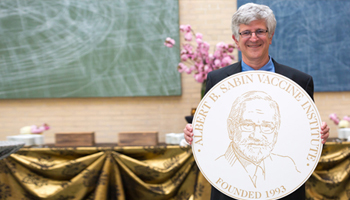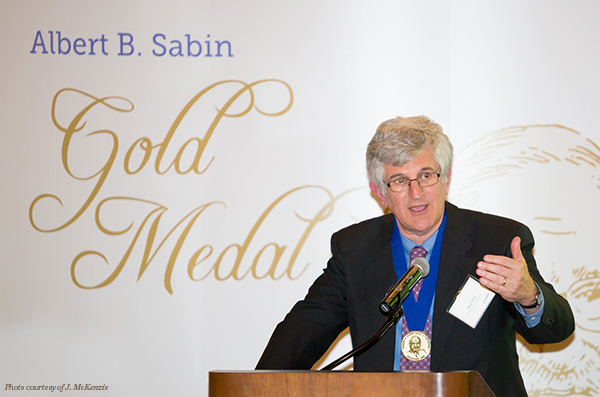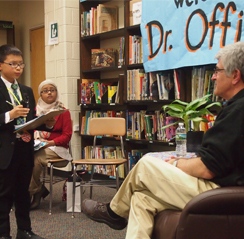HOW CAN WE HELP YOU? Call 1-800-TRY-CHOP
In This Section
Sabin Institute Honors Paul Offit, MD, Vaccine Champion
 Paul Offit, MD, director of Children’s Hospital of Philadelphia’s Vaccine Education Center (VEC) and Maurice R. Hilleman Chair of Vaccinology at Penn, added “gold medalist” to his vibrant list of honors and accolades, as he stepped up to receive the 2018 Albert B. Sabin Gold Medal from the Sabin Vaccine Institute last week in Washington D.C. The award complements Dr. Offit’s impactful, decades-long career as a researcher, author, professor, and strident spokesperson for accurate science, not to mention a champion for vaccine advocacy who has reached a range of audiences from the scientific to the mainstream, and from adults to children.
Paul Offit, MD, director of Children’s Hospital of Philadelphia’s Vaccine Education Center (VEC) and Maurice R. Hilleman Chair of Vaccinology at Penn, added “gold medalist” to his vibrant list of honors and accolades, as he stepped up to receive the 2018 Albert B. Sabin Gold Medal from the Sabin Vaccine Institute last week in Washington D.C. The award complements Dr. Offit’s impactful, decades-long career as a researcher, author, professor, and strident spokesperson for accurate science, not to mention a champion for vaccine advocacy who has reached a range of audiences from the scientific to the mainstream, and from adults to children.
Awarded annually, the Sabin Gold Medal recognizes individuals who have made significant contributions in vaccinology or complementary fields. It commemorates the legacy of Dr. Albert B. Sabin, renowned scientist and inventor of the oral live virus polio vaccine that nearly eradicated polio worldwide. As the 25th recipient, Dr. Offit received the award for his co-invention of RotaTeq®, an oral rotavirus vaccine, and his leadership as “one of the United States’ most vocal and dedicated advocate for immunization,” according to the Sabin Vaccine Institute.
 “It’s an honor to join the distinguished ranks of Albert. B. Sabin Gold Medal recipients,” Dr. Offit stated in the Institute’s press release. “Though our research may have focused on different diseases, we all share Dr. Sabin’s commitment to reducing human suffering. (…) I thank the Sabin Vaccine Institute for recognizing my research and advocacy with tonight’s award, and for its efforts to expand immunization globally.”
“It’s an honor to join the distinguished ranks of Albert. B. Sabin Gold Medal recipients,” Dr. Offit stated in the Institute’s press release. “Though our research may have focused on different diseases, we all share Dr. Sabin’s commitment to reducing human suffering. (…) I thank the Sabin Vaccine Institute for recognizing my research and advocacy with tonight’s award, and for its efforts to expand immunization globally.”
Dr. Offit began his rotavirus research in the 1980s, working with Stanley Plotkin, MD, and H Fred Clark, DVM, PhD, to identify which parts of the rotavirus made a person sick, and which parts conferred a protective immune response. It took Dr. Offit and his team 26 years to create the vaccine, RotaTeq®, but within just a decade of its introduction into the United States, child hospitalizations from rotavirus decreased by 85 percent. Rotavirus infections form the most common cause of diarrheal hospitalizations and deaths in children worldwide, and the vaccine, which is the first oral rotavirus vaccine to be prequalified by the World Health Organization (WHO), prevents rotavirus diarrhea.
But beyond his tireless work in the lab, Dr. Offit is equally renowned for speaking up about the importance of clear science communication and critical thinking, particularly when it comes to central issues in children’s health like vaccine safety and immunization.
Beyond the Bench and the Bedside: Vaccine Advocacy
Last January, Dr. Offit penned a guest post on our Cornerstone blog about the powerful ways that researchers can make an impact beyond conducting research the lab, such as educating parents and the public about the science surrounding vaccine concerns.
“Research takes many forms, and while progress is often the result of work conducted away from the public eye, sometimes the greatest potential for impact is the opportunity to talk about science and scientific discoveries in direct conversations with the public,” wrote Dr. Offit in the post.
This belief lies at the heart of the Vaccine Education Center at CHOP, founded in 2000 to provide accurate, up-to-date information for parents and healthcare professionals about vaccines and the diseases they prevent.
“As scientists, we were in a position to review and discuss the science of vaccines, and, so, the Vaccine Education Center at CHOP was born,” Dr. Offit wrote.
By reviewing the science, the VEC worked to dispel the myth that the MMR vaccine (measles, mumps, and rubella) caused autism, an unsubstantiated claim that traces back to a now-retracted 1998 paper in the Lancet. As the paper’s findings circulated around the time of the VEC’s creation, Dr. Offit and his team communicated the science behind the misconception to parents and the public by creating movies, appearing in the media, and designing tools for healthcare professionals that would help them easily disseminate the information.
Following an outbreak of the measles in 2014 and 2015, Dr. Offit continued his science-based, educational campaign for the MMR vaccine. He was featured in several mainstream media outlets, from CNN to the Wall Street Journal to disprove not just the myth that the vaccine caused autism, but other misconceptions in the anti-vaccine movement as well, like concerns about mercury in vaccines and whether children received too many vaccines.
But adults aren’t Dr. Offit’s only target audience.
 For the vaccine champion, it’s never too early to begin thinking critically about science and misinformation in the media. In the last few years, Dr. Offit has worked with the Philadelphia-based educational program, Healthy NewsWorks, which seeks to engage students, families, and the wider school community in accurate communication about key health topics. The program grew out of the dynamic interaction that Marian Uhlman, executive director and founder of the program, witnessed between Dr. Offit and elementary school students when he came to talk to them about his vaccine research.
For the vaccine champion, it’s never too early to begin thinking critically about science and misinformation in the media. In the last few years, Dr. Offit has worked with the Philadelphia-based educational program, Healthy NewsWorks, which seeks to engage students, families, and the wider school community in accurate communication about key health topics. The program grew out of the dynamic interaction that Marian Uhlman, executive director and founder of the program, witnessed between Dr. Offit and elementary school students when he came to talk to them about his vaccine research.
Last summer, the program’s fourth and fifth-grade reporters interviewed Dr. Offit as a 2017 community health leader, resulting in a chapter about Dr. Offit for their book, Leading Healthy Changes in our Communities 2017. Dr. Offit’s chapter outlined how he came become a vaccine advocacy champion, a story that begins when he was 5 years old recovering from a congenital club foot surgery in the hospital and seeing vulnerable children in the polio ward.
And then there are Dr. Offit’s own books, written for science enthusiasts in accessible, everyday language with the common theme of examining concepts like alternative medicine and the anti-vaccine movement with a clear, critical scientific eye. His most recent nonfiction work, Pandora’s Lab: Seven Stories Of Science Gone Wrong, published in April last year, takes a hard look at seven scientific discoveries in history and their consequences, including lobotomies, opium and opioids, and the rise of trans fats. In 2015, Dr. Offit released Bad Faith: When Religious Belief Undermines Modern Medicine, and in 2013 he published Do You Believe in Magic?: The Sense and Nonsense of Alternative Medicine, a book that lays out the science and science fiction behind megavitamins, supplements, and alternative treatments. Dr. Offit’s other books include Deadly Choices, about the anti-vaccine movement, and Autism’s False Prophets.
When we asked Dr. Offit in a Bench to Bedside Q&A about what gives him a sense of accomplishment, his reply was powerful and sure: “It’s all about child advocacy. I think each one of my books is about trying to protect children from harm. Again, it’s for the same reason that I wanted to make vaccines. Maybe I still see a little of myself as a child in that polio ward.”